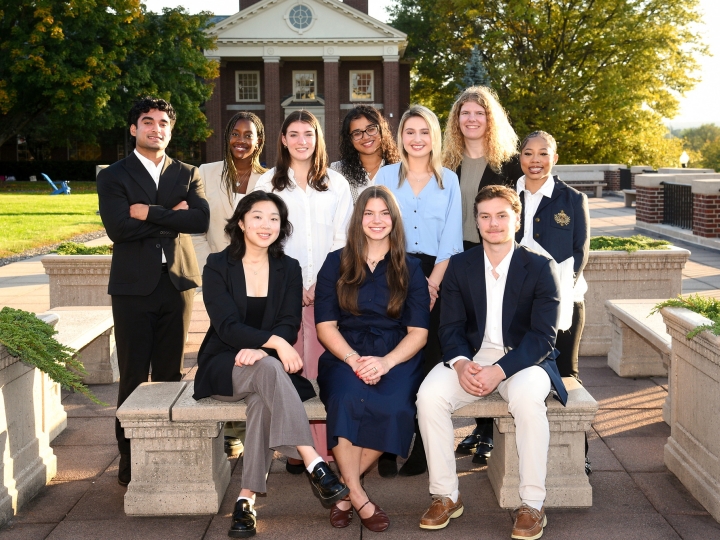Bucknell Among First 'Healthier Campus Initiative' Schools
March 1, 2018
Chris Gregory '18, a theatre, animal behavior and French triple major and a member of the cheerleading team, stays active by running and by taking multiple dance classes each week. "But being active is not equivalent to embodying 'wellness,' which I've learned the hard way over my four years on campus," he said. "I struggle with finding time to rest and refuel."
The question of what constitutes "wellness" is one that Bucknell and its students have worked to answer over a three-year commitment. Since February 2015, Bucknell has been part of the pilot cohort of the Partnership for a Healthier America's Healthier Campus Initiative (HCI), which challenges schools to adopt guidelines around nutrition, physical activity and wellness programming. The University was one of the first 26 schools nationally to participate.
Find Your Path
This spring, at a ceremony during the organization's national Building a Healthier Future Summit, Bucknell and the rest of its cohort will be recognized for successfully achieving the wellness goals established by the HCI.
"Wellness" refers to an individual's overall well-being: physical, mental and emotional health. The HCI aims to help college students overcome short-term problems like sleep deprivation, stress from classes and the dreaded "freshman 15" — and to establish good habits that will stick with them after graduation. Given Bucknell's longtime dedication to student wellness and a campus culture of physical activity, joining the HCI was a natural fit. More than 70 percent of students played varsity sports in high school and roughly 20 percent are involved in varsity teams here.
The HCI requires universities to choose 23 aspirational guidelines from a full list of 41, then work to achieve those goals. Examples include offering healthier dining options on campus, supplying plentiful water fountains, increasing the hours of the fitness center and providing free cooking and exercise classes to students. Bucknell had already met 12 guidelines upon signing up. The remaining guidelines were addressed through collaboration among the Bucknell Healthy Herd Group, a team of representatives from the offices of Student Health and Nutrition, Dean of Students, Outdoor Education & Leadership, Sports & Recreation, Finance and Dining Services as well as students in the Bucknell Nutrition Initiative Program club.
"The Healthy Herd Group is really meeting the needs of our student population well," said Tanya Williams, the University nutritionist who spearheaded Bucknell's participation in the HCI. "They're listening. If the students say they want something new — for example, a bike-share program — they listen to those requests and implement them."
For Gregory, the hardest part has been mental and emotional wellness and he's glad for the support he receives across the University. "The Bucknell community has helped me stay on track, health-wise. My professors are always talking about the importance of sleep, which keeps it a priority for me."
Alisha Griffin '21, an animal behavior and anthropology major, appreciates both the push to be more active and the focus on nutrition. "Setting goals has been a lot easier here than at home," she said. "The cafeterias promote healthier foods and everything is fresh and tasty. I've also noticed greater inclusion of vegetarian and gluten-free foods for students."
Participation in the HCI is only one step in a campus movement that includes the 2016 opening of the Graham Building, which houses health, wellness and counseling services.
"We are proud to have received this recognition from the Healthier Campus Initiative in acknowledgment of how intrinsic wellness is to our university culture," said Amy Badal, dean of students. "By aligning ourselves with the initiative's guidelines, we've continued to commit to the well-being of our students, not just academically but also holistically."

